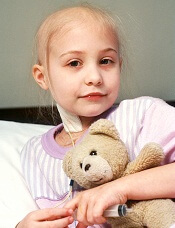
Credit: Bill Branson
Childhood cancer patients are no more likely than their healthy peers to develop post-traumatic stress disorder (PTSD), according to research published in the Journal of Clinical Oncology.
“A cancer diagnosis is a highly significant and challenging event, but this study highlights the impressive capacity of children to adjust to changes in their lives and, in most cases, do just fine or even thrive emotionally as a result,” said study author Sean Phipps, PhD, of St Jude Children’s Research Hospital in Memphis.
PTSD is a treatable anxiety disorder that can develop following terrifying events that result in real or potential physical harm. The diagnosis is based on patient reports of certain symptoms, including persistent frightening thoughts, flashbacks, numbness, detachment, and sleep disturbances.
For this study, researchers used 3 established PTSD screening methods on 255 pediatric cancer patients (aged 8 to 17 at diagnosis) and 101 of their healthy, demographically matched peers.
This included a symptom check list and a structured diagnostic interview about the event in a child’s life he or she identified as the most traumatic. The researchers also interviewed parents about PTSD symptoms in themselves and their children.
Based on self-reported symptoms, 2.8% of cancer patients (n=7) met the criteria for a diagnosis of PTSD, either when the study was conducted or in the past.
The PTSD was cancer-related in 2 of these patients. In the other 5 patients, the disorder was linked to a drive-by shooting, Hurricane Katrina, or other stressful events.
By diagnostic interview, 0.4% of the cancer patients met PTSD criteria. According to parents’ reports, 1.6% of the cancer patients met criteria for current PTSD, and 5.9% met lifetime criteria.
These rates of PTSD were not significantly different from the rates reported in the healthy control subjects (all P values were greater than 0.1).
Unlike many previous studies of PTSD in cancer patients, researchers initially refrained from asking patients specifically about their diagnosis. Investigators wanted to avoid suggesting to patients that their cancer diagnoses were traumatic.
“We know such suggestions, called ‘focusing illusions,’ prime individuals to think about their cancer experience as traumatic and leaves them prone to exaggerating its impact in subjective reports,” Dr Phipps said.

